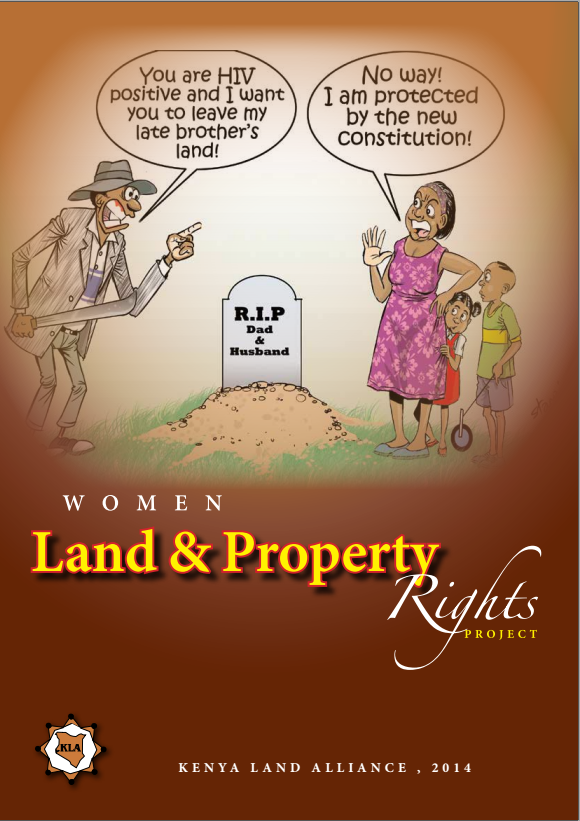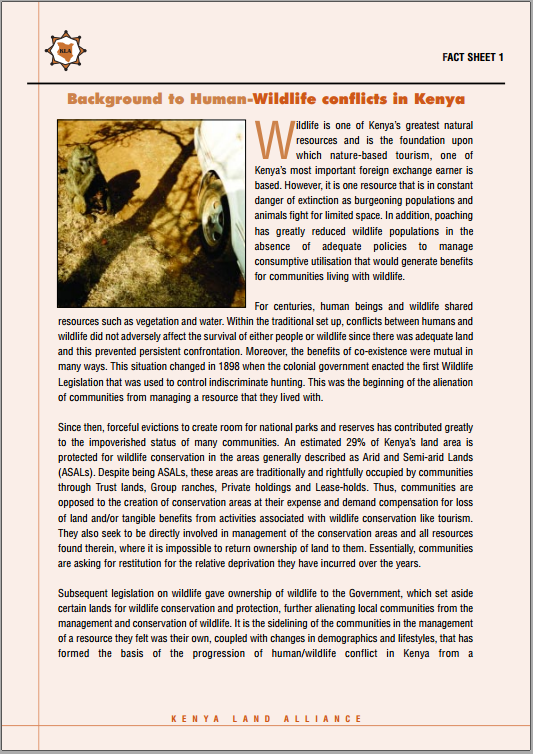The Kenya Land Alliance (KLA) is a not-for-profit and non-partisan umbrella network of Civil Society Organisations and Individuals committed to effective advocacy for the reform of policies and laws governing land in Kenya. KLA was founded in 1999 and registered as a Trust in 2001. The initiative to create an institutional framework for land laws and policy advocacy in Kenya was necessitated by the realization that the policy, legal and institutional framework created in 1950’s had become inadequate due to many changes in the social, political, economic and cultural fronts that had occurred in the country over the years.
The increased population has resulted in intense competition for access to land and natural resources. In addition, changes in the global environment brought about by globalization have combined to create a reality that is significantly different from the one existing when the
current framework was created in the 1950s. It is on this premise that KLA has been in the forefront in efforts towards effective advocacy for land laws and policy reforms in Kenya, as recently witnessed in the Presidential Commission of Inquiry into the Land Law System of
Kenya and the Constitution of Kenya Review Commission. Advocating for the formulation and implementation of a National Land Policy and review of land laws.
Our Vision
A society in which all people are assured of sustainable livelihoods through secure and equitable access and utilisation of land and natural resources.
Our Mission
To facilitate the activities of members by gathering and disseminating information towards an all-embracing, participatory and comprehensive land policy and law reforms in Kenya.
Members:
Resources
Displaying 21 - 25 of 76National Conference on Emerging Land Issues in Kenyan Agriculture and their Implications for Food Policy and Institutional Reforms
For a long time sub-Saharan Africa has been considered to have abundant and underutilized land than any other continent. On the contrary, recent studies show that many rural Africans live in increasingly densely populated areas where all arable land is allocated or under cultivation. This has led to a long-term decline in farm size and reduced fallows.
Land & Property Rights
The women Land Rights Project is a project of Kenya Land Alliance that aims at actualisation Women land and property rights, as provided in the Constitution of Kenya, 2013 and as a means towards poverty alleviation. This considering the fact that, in Kenya where the foundation of most communities is Agriculture and livestock production, women contribute up to 80% of workforce yet they only hold 1% of registered land in their names and around 5-6% of registered titles are held in joint names (Kenya Land Alliance, 2013).
Community Land Law.
A report of a Conference held in Nairobi 6-7th June 2013. Includes case studies on community land rights from South Africa, Uganda, Mozambique, Rwanda, Brazil and Kenya.
Background to Human-Wildlife conflicts in Kenya
Wildlife is one of Kenya’s greatest natural resource and is the foundation upon which nature-based tourism is based. However, it is one resource that is in constant danger of extinction as burgeoning populations and animals fight for limited space In addition, poaching has greatly reduced wildlife populations in the absence of adequate policies to manage consumptive utilisation that would generate benefits for communities living with wildlife.
THE LAND SECTOR NON-STATE ACTORS (LSNSA)
kenya land alliance download :Memorandum On Continued Engagement With The Ministry Of Lands On Land Reforms Presented To: The Ministry Of Lands. The approval by the public of the Constitution at the referendum on August 4, 2010 and its promulgation on August 27, 2010 heralded a new dawn of governance in Kenya. Through its broad provisions, it is expected that it will spur social and economic development and secure the land rights of all Kenyans, by among others guaranteeing them ownership, control and access to natural resources.






